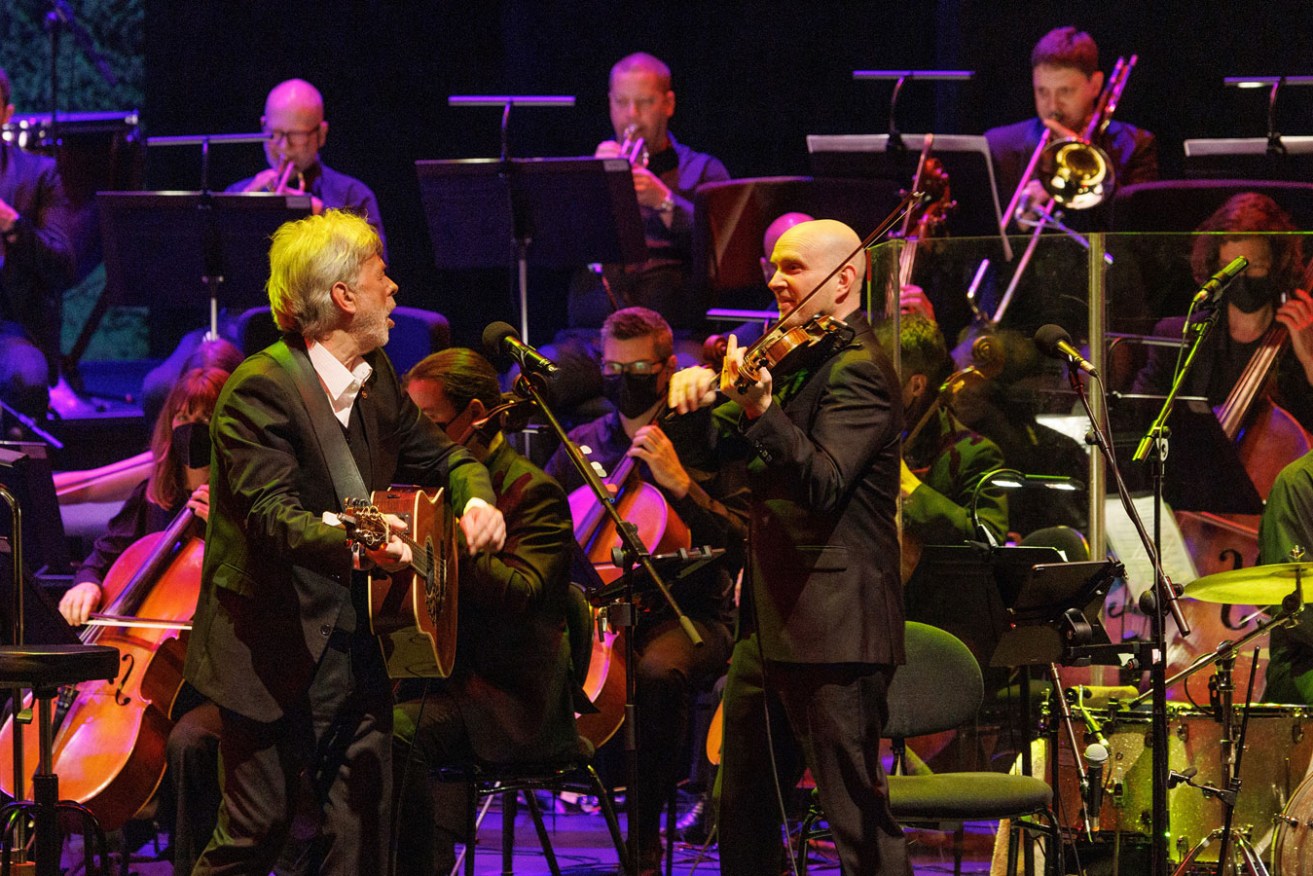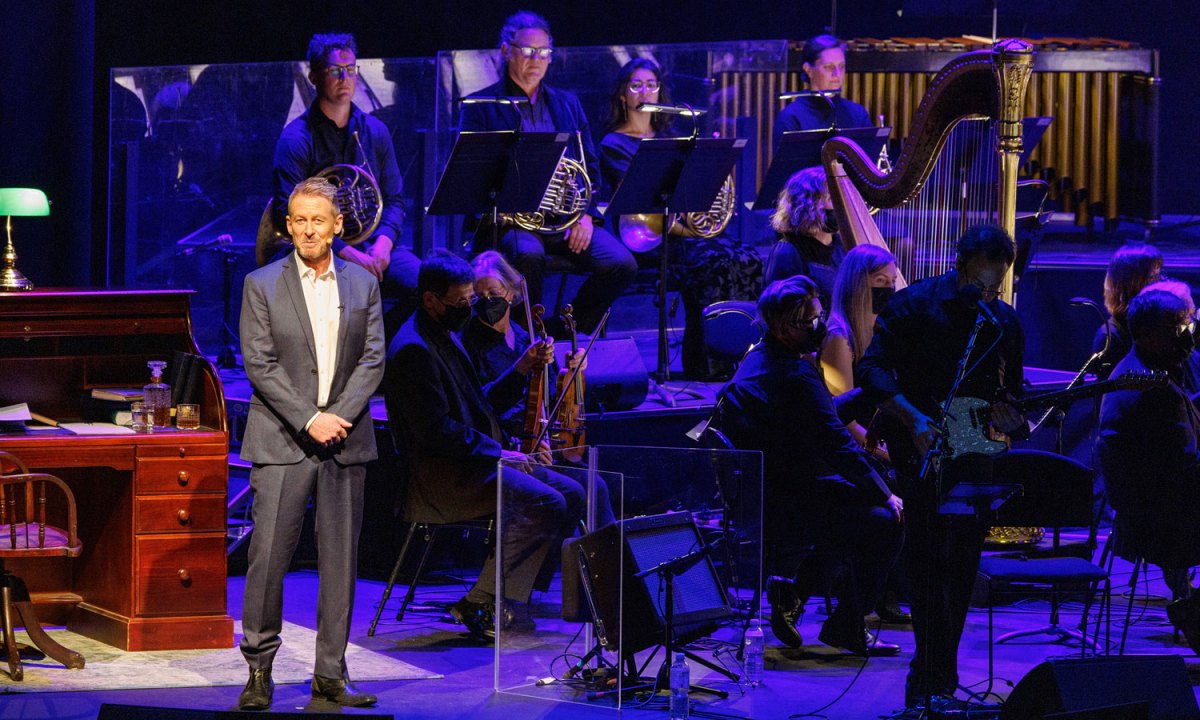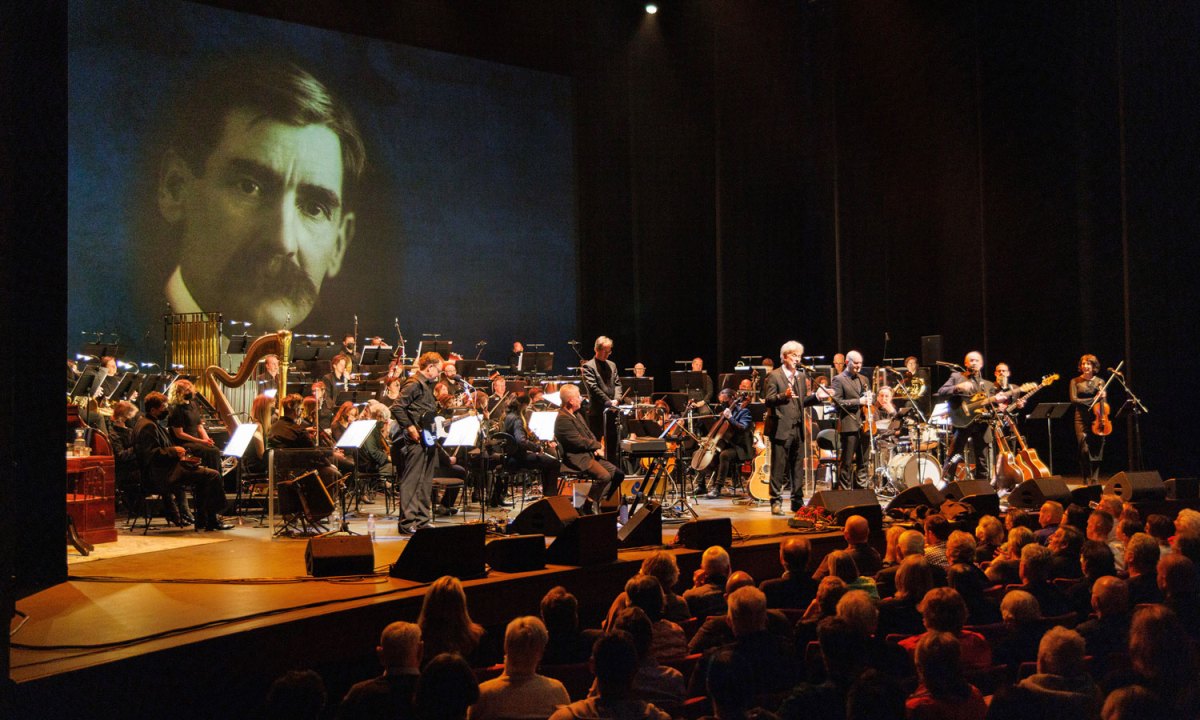Music review: Henry Lawson – A Life in Words and Music
A full house greeted John Schumann and The Vagabond Crew for this rich and compelling performance with the Adelaide Symphony Orchestra.


John Schumann and Julian Ferraretto at 'Henry Lawson: A Life in Words and Music'. Photo: Tony Lewis / ASO
The concert, narrated by acclaimed actor Richard Roxburgh, was a reprise of Schumann’s 2005 Lawson album.
Henry Lawson is an Australian icon. Although he was sometimes destitute and reduced to begging, he was so well regarded that he received a state funeral. He featured on Australia’s first decimal $10 banknote, and his story The Drover’s Wife still inspires readers.
He wrote of the country he knew, even if he was not always at ease with it, as Frank Moorhouse has claimed. The subject matter and intrinsic bush-ballad voice in his work aligned with the general population’s sense of an Australian identity, albeit a white one. It was marketable.
Lawson’s poems were typically stories of hard times. Populated by iconic figures in situations of heroism or difficulty, they sat well alongside works by Banjo Paterson and CJ Dennis. Even when inclined to mythologise, they reflected the lives and concerns of many readers.
For this concert – presented at the Festival Theatre on the centenary of Lawson’s death – a warm welcome to country was delivered with aplomb by Uncle Mickey O’Brien. It was a heartfelt introduction to the evening’s music.
Richard Roxburgh featured eloquently between songs, speaking from the side of the stage by a lamp-lit roll-top desk, as if it were Lawson’s own. The narration was written by the late Brian Matthews and Schumann.

Narration by Richard Roxburgh set the scene for the music. Photo: Tony Lewis
The performance began with the Adelaide Symphony Orchestra’s lyrical overture, conducted by Luke Dollman. The stirring arrangement for this and all other work on the night was by composer Julian Ferraretto, a member of The Vagabond Crew.
The songs, based on Lawson poems, came in the same order as on Schumann’s Lawson album, beginning with the rueful “To an Old Mate”. The vocals were somewhat overwhelmed by the orchestra at first, but it was still a rich and commanding rendition.
Suppressed fear for a son, whereabouts unknown, was rendered well in the regretful “Knocking Around”. Sadness and loss were key aspects again in the mournful “The Glass on the Bar”, a wistful story of three mates entering a bar with news of another who has died. The empty glass becomes a memorial. This song began with just the band, the orchestra gradually joining in, and the vocals were now more distinct.
“Second Class Wait Here” is a straightforward protest, taking a railway station sign as a starting point for commentary on class prejudice. On the album, it is strident, vocally raw and without much modulation. The addition of the orchestra did not soften the energy of this objection; it actually added drama.
“Faces in the Street” is also a social commentary, delivered with a driving martial beat. Its growing volume ultimately suggests a massing and united crowd moving in the same direction. The ASO added a strong feeling of force here.

A photo of Henry Lawson was projected behind the musicians on the Festival Theatre stage. Photo: Tony Lewis
Songs of regret, frustration and injustice. Those themes essentially continued, as they did in much of Lawson’s wider work. The sentimental “The Bush Girl”, for instance, sketches her being rejected and pining for lost love. “To Hannah” concerns another love lost, but one which is sustaining for the narrator: “I am walking with the spirit / of a dead girl by my side”. In the wistful “To Jim”, a father watches his son and predicts a gruelling future much like his own, while hoping that the pair will still be close.
While sadness and fear permeated the lyrics of the remaining songs, the quality of the musical performance lifted the mood. Surprise guest Shane Howard (part of the original Vagabond Crew line-up that recorded Lawson, and lead singer of Goanna) joined for the encore, which comprised the Redgum hit “I Was Only 19”’ and a slightly rearranged “Waltzing Matilda”. Both were received with much applause.
Throughout the show, the ASO’s contribution was a delight, allowing songs to blossom. The reception given to this adaptation of the Lawson album suggests its performance would also be welcomed in other parts of the country.
Henry Lawson: A Life in Words and Music was performed for one night only at the Festival Theatre.




